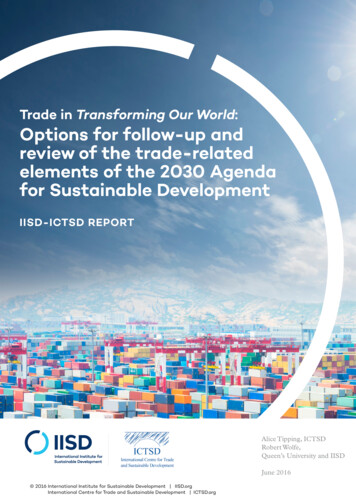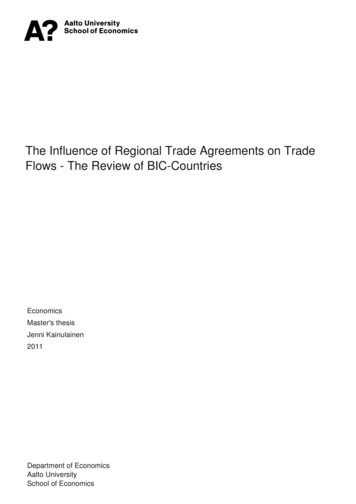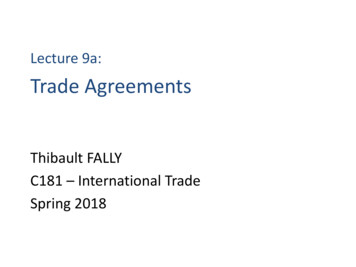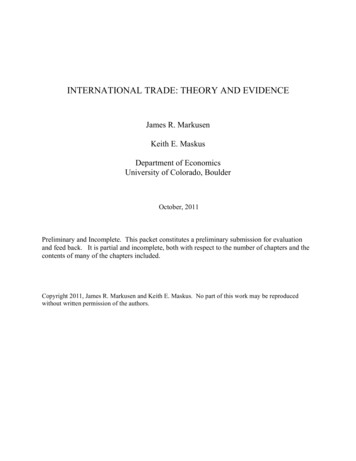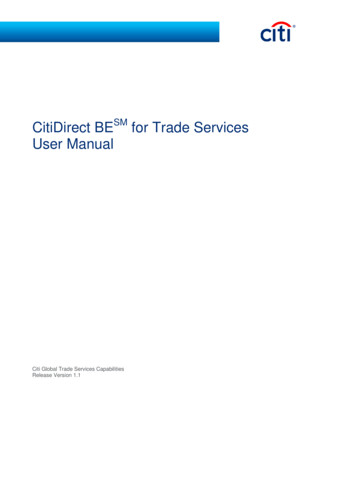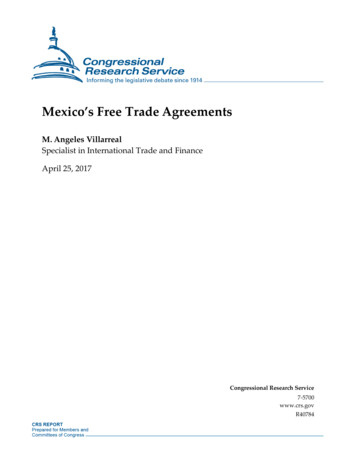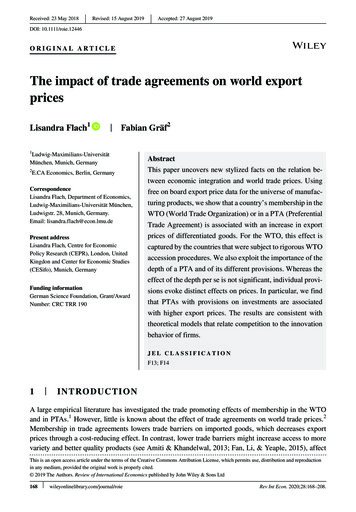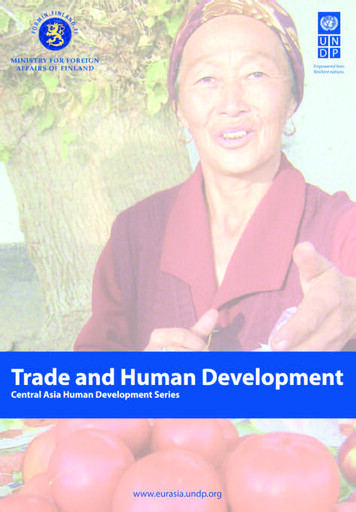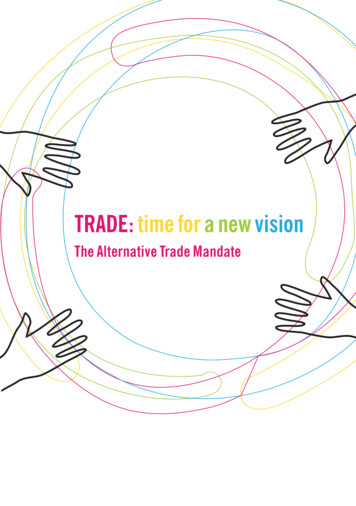
Transcription
Trade: time for a new visionThe Alternative Trade Mandate
ForewordThe Alternative Trade Mandate has been developedin extensive civil society consultations all over Europe.The members and supporters of the Alternative TradeMandate Alliance do not necessarily agree with eachand every detail in this paper, but support the generalline of thinking. We also consider it a living documentand an invitation for others to join the debate on thefuture of EU trade and investment policy.The Alternative Trade Mandate Alliance is analliance of development and farmers’ groups,Fair Trade activists, trade unionists, migrant workers,environmentalists, women’s, human rights, faith andconsumer groups from all over Europe, developing analternative vision of European trade policy thatputs people and planet before big business.Contents3 Trade: time for a new vision5 The Alternative Trade Mandate: core principles6 The Alternative Trade Mandate’s underlying principle:democratic control over trade and investment policy making8 Alternative Trade Mandate: 10 key issues
Trade: time for a new visionThere’s no doubt – the world’s corporate trade model is failing people, communities, and the environment.Trade should be about exchange, with ecologicallyand culturally distinct regions equitably sharing theirproducts, skills and creativity. But in recent decades,trade has become less about exchange of goods and moreabout eliminating social and environmental safeguardsin pursuit of corporate profit. The proposed EU-US freetrade agreement – the Transatlantic Trade and InvestmentPartnership – is a good example: while the elimination oftrade barriers between Europe and the US is touted as away out of the economic doldrums for these two blocs, inreality it is set to seriously erode social, environmental andlabour rights.This ever-quickening race to the bottom has destroyedlives, livelihoods and communities. Today, trade is usedas a system of control by the powerful, and to promote thespecific interests of the few.The injustice of our international trade system has nowhit home in the heart of Europe – for Europe’s economiccrisis is not just one of debt, but of corporate trade too.The elimination of capital controls and the liberalisationof financial services that allowed banks and the financialservices sector to recklessly speculate – added to traderules in the EU that allowed huge trade imbalancesbetween members – have exacerbated Europe’s debtcrisis. The subsequent imposition of privatisation, thegutting of labour protection laws and swingeing socialcuts (while the banks that fuelled the crisis are protectedby trade laws) mirror the damaging impact of trade ruleson millions of people elsewhere around the globe.Our trading system also consistently breaches thelimits to our planet’s biosphere. The EU’s ecologicalfootprint – generated by its trading system and its levels ofconsumption – is one of the largest in the world. This hasled to the dispossession of communities to land, waterand other resources worldwide, while bringing our planetever closer to catastrophic climate change.A new vision for trade is not only possible butabsolutely necessary. It must be based on a newset of principles, and respect the EU’s internationalcommitments and legal obligations to ensurecoherence in its policies, be they on democracy,cooperation, public participation, human rights,social justice, gender equality or sustainability.Transparency should be at the heart of such policies:in addition to a genuine and continuous participationprocess, the EU and its member states must assess theimpacts of their actions and make the results public, sothat citizens can make informed choices.Convinced by this need, over 50 Europeanorganisations – representing farmers, trade unions,human rights advocates, environmentalists, fair tradenetworks and development workers – have cometogether to develop the Alternative Trade Mandate.This calls for an overhaul of the trade regime – onethat leads to real workable alternatives, where tradeworks for everyone, and the environment.Unlike current trade negotiations – held behindclosed doors with privileged access for multinationalcorporations – consultations for this mandate havebeen participatory and transparent, and havehighlighted 10 areas of trade in need of reform. Thismandate discusses the 10 areas in detail, as wellas the essential principle underlying these reforms:the need for democratic control over trade andinvestment policy making.This document is open for comment because webelieve only a trade mandate by and for people andour planet will work. Please read this document andcontribute your thoughts.3
4Trade: time for a new visionThe Alternative Trade Mandate
The Alternative Trade Mandate: core principlesDemocratically controlled trade and investment policies lie at the heart of the Alternative Trade Mandate.Our mandate demands trade and investment policies that allow:an industrial policy to be promoted, to favour ajust transition towards a different developmentmodel.binding social and environmental regulationsto be strengthened, and full transparency inglobal value chains.human rights, women’s rights, labour rights,indigenous rights, and the protection of ourenvironment to take priority over corporateand private interests.structural transformation, universal accessto quality public services, social protection,higher labour and environmental standards,democracy and transparency.governments to regulate imports, exports andinvestments in pursuit of their own strategiesfor sustainable development.countries, regions and communities to regulatethe production, distribution and consumptionof their own goods and services.European trade policy to respect the right ofcountries and regions to develop – and givepriority to – local and regional over globaltrade (for example, in the food sector).European governments and parliamentsto hold their corporations to account for thesocial and environmental consequences oftheir operations in Europe and elsewhere.food sovereignty to be respected, allowingcountries and communities to prioritiselocal and regional food systems.a fair distribution of income within globalvalue chains, guaranteeing a stable anddecent income for producers and workers, andaffordable prices for consumers, particularlyfor necessities such as food and medicines.governments, parliaments and publicauthorities to have full rights to regulatefinancial markets and the financial servicessector, in order to protect social rights andwelfare, secure sustainability, safeguarddemocratic control, and ensure financialstability (including restricting capital flows).the exchange of, and free access to, knowledge– e.g. through open source systems, seedexchange initiatives or patent pools, and openlicensing to promote innovation and accessto medicines.for certain sectors, such as public goods suchas water, health and education, or financialservices, to be excluded from European tradeand investment negotiations.common but differentiated responsibilities tobe recognised for developing countries, andspecial and differential treatment to be ensuredfor the poorest ones.the precautionary principle (where responsibilityis taken to protect the public from suspected,if not proven, harm), to be applied in allregulation and trade and investment rules.5
The Alternative Trade Mandate’s underlyingprinciple: democratic control over trade andinvestment policy makingTo develop fairer and more democratic societies, we not only need to change the EU’s trade and investment policiesas described in the next sections, we also need to change the way in which decisions about trade and investmentare made: people need to claim democratic control over the EU’s trade and investment policy processes.Key problemsThe secrecy of trade negotiations: EU tradenegotiations with third countries take place behindclosed doors. No negotiating position or text isreleased to the public in either country until afternegotiations have been concluded – even thoughEU trade agreements affect Europeans as muchas any publicly debated law.Trade and investment policy is controlled byunelected officials: The EU’s trade policy isdominated by the European Commission – a nonelected body. The Commission alone has the rightto initiate trade policy, propose trade legislationand undertake trade negotiations. Neither citizensnor the European or national parliaments havethis right. The role of the European Parliamentis limited purely to the ‘nuclear option’ ofeither saying ‘yes’ or ‘no’ to a trade deal whennegotiations have been concluded.6The Commission also grants business undueinfluence over its trade-policy making – inhundreds of exclusive meetings behind closeddoors. As a result, corporate fingerprints areall over the EU positions in trade negotiations,leading to results that are not in the interest ofEurope’s people.De facto irreversibility of EU trade agreements:Trade and investment agreements severely limitthe future democratic choices of a society becausethey ‘lock in’ policy options and grant corporationsfar-reaching powers to challenge new laws.Changing trade agreements is much more difficultthan changing ordinary national legislation andcan lead to costly compensation claims.Mock consultations of citizens: It’s rare that theEuropean Commission grants civil society thechance to discuss the issues at hand. Even whenit does, the discussions are very technical, have apro-free trade bias and no formal status in terms ofaffecting policy.The Alternative Trade Mandate view: endingsecrecy, corporate capture and EC dominanceCorporate lobby groups in the driving seat:By contrast, the European Commission allowscorporate lobby groups access to sensitiveinformation about on-going trade negotiations –information withheld from public interest groups.significantly altering the European Commission’sTrade: time for a new visionThe Alternative Trade MandateWe propose a totally new procedure for initiating,negotiating, finalising and reviewing tradeagreements that ensures a much larger rolefor civil society and parliaments. This meansrole in trade policy, preventing corporate capture,and getting rid of the excessive secrecy thatcharacterises the process at the moment.
How do we do this?Assuring transparency and openness: All negotiatingpositions and draft texts must be published promptly.The Commission, member states and parliamentsmust regularly and pro-actively provide online accessto information about meetings and correspondencebetween officials, parliamentarians and lobbyists,in order to inform the public on who’s attempting toinfluence trade negotiations, on whose behalf, withwhat means and agenda, and with what success.Strengthening the role of parliaments: The startingpoint for our alternative is reducing the role of theEuropean Commission, and strengthening that ofparliaments. This needs to happen at all stages ofthe decision-making and negotiating process. Ifdemocracy is about political decisions being madeby people and their elected representatives, tradeand investment policies cannot remain with anunelected body.Assuring meaningful civil society participation: Inorder to ensure a maximum level of inclusion andparticipation, national parliaments should organisemeaningful civil society participation at the nationallevel. Only national parliaments and the EuropeanParliament should be able to take the initiative tolaunch the process leading to trade negotiations.But before the process of initiating trade negotiationsbegins, extensive independent, transparent andinclusive ‘needs tests’ must be conducted with civilsociety organisations, including NGOs, trade unionsand other representative bodies in EU member states.Similarly, needs tests should take place in the partnercountry to find out whether a trade agreement wouldbe in the public interest in the first place.The parliaments will also regularly organise publicconsultations on the progress of the negotiations, andwhen a draft agreement has been reached betweenthe Commission and the partner country.Conclusion and revision of trade agreements: Whena provisional agreement has been reached betweenthe EU and the partner country, the agreement will besubject to an independently conducted Human Rightsand Sustainability Impact Assessment (HRSIA).This will be published, allowing for another round ofpublic consultation and democratic scrutiny. Bothnational parliaments and the European Parliamentmust have the right to propose amendments to theprovisional text, which has to be renegotiated. Thefinal agreement will have to be ratified by Europeanand national parliaments.Once the agreement has entered into force, a thoroughassessment must take place at least every five years.At any time, European and national parliaments, aswell as the partner country, can demand to negotiaterevisions to the agreement.Preventing corporate capture: Throughout theconsultation and decision-making process, privilegedaccess and ‘policy capture’ by industry lobby groupsmust be prevented. Consequently, consultations mustensure that a diverse range of interests and viewpointsare pro-actively reflected, including those that will bedirectly and indirectly affected by a trade agreement.7
Alternative Trade Mandate: 10 key issuesIssue #1: Food, and how we produce itOur globalised food system is failing our farmers, our health, and the environment. Moreover, mass food productionhas failed to eliminate hunger for millions of people. Liberalised trade and lack of market regulation have led tofarmers worldwide selling at prices below the cost of production, making farm livelihoods unsustainable.Key problemsThe EU’s export-orientated ‘corporate food factory’is dominated by large corporations and theCommon Agricultural Policy (CAP) – a policy drivingoverproduction in the EU and leading to dumping andthe destruction of local and regional markets for farmersin developing countries. It also causes low and unstableprices for European farmers.In Africa, the at-times willful neglect of small farmers bynational and international policy means that many canno longer feed themselves. The liberalisation of tradeand provisions in bilateral trade agreements to openup local markets to cheap European imports are set tomake their situation worse.Moreover, scarce natural resources in developingcountries are being used for the export-orientedHow do we do this?The EU has to drastically change its CommonAgricultural Policy, and its trade and environmentalpolicies.The EU needs to:· respect the right to food and ‘food sovereignty’,meaning people in Europe and the Global Southhave the right to define and control their ownlocal food systems, choose what they eat, andmake sure their community’s food is healthy andaccessible to everyone.· move away from multilateral, bilateral and regionalfree trade rules that distort prices for farmers andlead to unequal access to natural resources, and notforce trading partners to reduce tariffs and quotas,especially where designed to protect food securityand farmers’ livelihoods. Instead the EU shouldsupport safeguard measures which developingcountries can take to protect local markets fromcheap imports.8Trade: time for a new visionThe Alternative Trade Mandateproduction of ‘luxury’ goods such as soybeans andbiofuels for Europe, while the worldwide expansion ofthe EU food system also has widespread and devastatingenvironmental impacts.The Alternative Trade Mandate view: a sustainableapproach to foodThe right to food cannot be secured for everyone usingthe existing model of ‘industrial’ agriculture, producingfood for an unregulated global market. To stop thedestruction of agricultural markets in the global south,and reduce EU dependence on (and depletion of)natural resources in these countries, the EU needs toset a long-term goal of becoming as self-sufficient aspossible in food and feed.· become more self-sufficient in products that can beproduced in Europe, especially protein and oil cropsas alternatives for imports of (gmo-)soybeans, palmoil and biofuels (these commodities have particularlydevastating impacts on small farmers and theenvironment in exporting countries).· eliminate imports of biofuels to the EU, abandon itsbiofuels directive and replace it with other measuresdesigned to reduce demand for fossil fuels in Europeantransport.· where the EU needs to import food products thatcannot be produced in the EU (e.g. coffee and cocoa),it must ensure they are sustainably produced and thata fair price is paid to producers. It needs to increasethe use of aid budgets to help exporting countriesimplement high environmental and social exportsstandards, ensuring local livelihoods and foodsecurity are not compromised.· abandon European tariff escalation on processedtropical products – helping producers and companiesin exporting developing countries to earn the addedvalue for processing.
· bring investment in food and farmland in non-EUcountries – which has hugely damaging impacts onfood production, livelihoods and the environmentin those countries – under new, binding investmentagreements with human rights obligations.· strengthen environmental and animal welfarestandards for European farmers and ensure thatEuropean agribusiness and retail cannot buycheap products on the world market that havelower production standards.· support sustainable farming practices in Europe andthe Global South that protect biodiversity, enhancethe fertility of soils, reduce the use of fossil fuels andhelp prevent climate change.· stop all legal initiatives endangering old seedvarieties and strengthen policies against GMOswithin European cultivation and imports.· improve – not abolish – the current EU supplymanagement system for dairy and sugar, and exploreextending the principles of supply management toother basic products such as meat and grains.· promote well-managed food (especially grain)reserves as a tool to reduce excessive volatility inagricultural commodity markets.· strengthen declaratory obligations for additives,nano-technological substances and GM feedused in egg, diary and meat production.· respect and reward family farmers, with costcovering prices guaranteed, and internalise allenvironmental, social and animal welfare costsin the consumer price.Issue #2: Jobs and labour rights – how we create and protect themEU trade strategy aims to make it easier and cheaper for goods to be traded and for services to be competitivelytendered and outsourced, with no ownership restrictions or curbs on capital movements. This allows transnationalcompanies to quickly move production from one country to another in search of the most favourable conditions andto threaten unions and governments if they try to regulate their activities. In this way, current trade and investmentrules put workers virtually everywhere in competition with each other, forcing governments to engage in a race to thebottom on labour rights and taxation policies in order attract investment.Key problemsCountries attempting to maintain decent labourstandards are threatened with mass redundancies, whileworkers in countries with lower standards ‘subsidise’ theproduction of cheap products through poverty wages,unsafe working conditions and subsequent hardship.This policy only serves the interests of economic eliteswho want to offer cheaper products to consumers whilepushing for stricter protection of medicine patents andinvestment, as well as more market access for theirown enterprises. Additionally, liberalising trade exposesdomestic companies, especially small and mediumHow do we do this?The EU needs to:· assess in advance and carefully monitor theimpacts of trade agreements on employment andsocial as well as environmental rights, allowingrepresentatives of urban and rural sectors, tradeunions and CSOs to monitor the implementationenterprises (SMEs), to international competitionwhich can result – particularly in the case of tradebetween unequally developed countries – in loss ofmarket share and considerable jobs losses, and ingeneral to unfair trading practices.The Alternative Trade Mandate view: supportingthe globalisation of decent workThe Alternative Trade Mandate aims to enable thecreation of more decent jobs worldwide, and topromote a trade policy that serves labour rights.of the social dimension of trade agreements,and to negotiate implementing arrangements.· establish binding provisions and labour disputesettlement mechanisms with strong tradesanctions (suspension of trade benefits) forcorporations and signatory countries.9
· enforce labour standards by means of investors’responsibility mechanisms, with the power tofine companies that transgress.· promote the ratification and full implementationof all ILO conventions and the OECD guidelinesfor multinational enterprises.· reinforce customs’ services so as to effectivelytrack and seize goods made by child and forcedlabour.· hold corporations accountable for the social andenvironmental consequences of their operationsin Europe and elsewhere.· ensure internally and abroad the right to formand to join trade unions, promoting collectivebargaining and wage formation at sectoral andintersectoral levels.· guarantee the free movement of persons and theapplication of working and contractual conditionsof the destination countries, if more favourablethan those of origin.Issue #3: Preserving policy space to realise human rightsCurrent EU trade policy aims to limit individual countries’ policy space to regulate trade and protect localmarkets – regulations that are necessary to protect the livelihoods of vulnerable segments of society andrealise economic, social and cultural rights.Key problemsStates have an obligation under international law torespect, protect and fulfill human rights, includingeconomic, social and cultural rights. Current EU tradeagreements, however, contain obligations that makeit more difficult or even impossible for other statesto do this: excessive tariff reduction provisions intrade agreements can result in import surges of foodproducts, drive local farmers out of the market andthreaten their incomes and human right to be able tofeed themselves.Trade initiatives that focus on export-led developmentin the agricultural sector can fuel land grabs, forcedevictions and threaten the rights of rural communitiesto food, housing and water. Intellectual propertyrights provisions can limit small farmers’ access toseeds, or sick people’s access to generic medicinesat affordable prices, thereby threatening their humanHow do we do this?The EU needs to:· revise its trade policy to make it coherent with its ownand with Member States’ domestic and extra-territorialhuman rights obligations – the overarching principlemust be the primacy of human rights.· make sure that trade agreements never limit the policyspace of other countries to take measures necessaryfor the realisation of human rights.· systematically integrate human rights into itsSustainability Impact Assessments (SIA).10Trade: time for a new visionThe Alternative Trade Mandaterights to food and health. Provisions on services intrade agreements can force countries to privatisepublic services and threaten poor people’s humanrights to water, health and education, because theyare unable to pay market prices for these services.The Alternative Trade Mandate view: ensuringprimacy of human rights over corporate interestsAn Alternative Trade Mandate starts from theprinciple that human rights have primacy overcommercial interests of corporations. EU MemberStates have an obligation to respect, protect andfulfill human rights not only domestically but alsoextra-territorially. Moreover Articles 3 and 21 ofthe Lisbon treaty oblige the EU to respect andpromote human rights in their foreign policies,including in trade policies.The new Human Rights and SustainabilityImpact Assessments (HRSIA) must be conductedbefore the start of any negotiation by anindependent institution, and with broad civilsociety participation. The HRSIA findings must bepublished and debated in the European Parliament,and provide the basis for the formulation of anytrade negotiation mandate.· Trade agreements and initiatives that are found tothreaten human rights in Europe or in other countries must be terminated or fundamentally revisedbased on a public and parliamentary debate.
Issue #4: Money, and how we invest itInternational investment treaties offer market access and high levels of protection for foreign investors, severelycurtailing domestic policy space. They also prevent the restriction of capital flows in and out of a country – meaninggovernments can lose control of their own economies.Key problemsInternational investment treaties offer unlimitedmarket access to foreign investors, as well as many ofthe benefits usually reserved for domestic companies.This reduces policy space and has a negative impacton social welfare, environmental protection andeconomic development, as local industries findthemselves competing with powerful transnationalcorporations.Investment treaties have also led to an growing‘epidemic’ of giant companies using clauses to suecountries if they feel those countries’ policiesHow do we do this?Our governments need to:· stop pretending unrestricted foreign directinvestment (FDI) is a ‘magic bullet’ thatautomatically benefits host countries .· terminate existing investment treaties of MemberStates that hinder host states’ legal obligation torespect, protect and fulfill human rights and ensuresustainable development.· retain the right to monitor investor behaviour and say‘no’ to undesirable or unsuitable foreign investments– even after the investment has been made; e.g. ifthe investor has transgressed, or if national policydecisions made post-investment mean it is nolonger in the public interest.· maintain the right to enforce capital controls to stopforeign investors suddenly pulling their money outof an economy.· stop tax dodging, set adequate rates of taxation androyalties, and make sure foreign investors pay atleast the same amount of tax as national companies,publicly reporting on their tax behaviour on acountry by country and project by project basis.· be able to exercise the above rights without beingthreatened by investors in costly internationalcourts, such as the International Center for theSettlement of Investment Disputes.(e.g. in relation to labour rights or environmentalprotection) threaten their profits. This is hugelyexpensive for public treasuries, and is discouraginggovernments from introducing protective social orenvironmental measures.The Alternative Trade Mandate view: investingin a fair futureForeign investment needs to be used to build afairer and more sustainable future for individuals,communities and our environment – not just tocreate profit for those with money to invest.· ensure that foreign investors and theirsubsidiaries bear legal liability, including in theirhome states, for any complicity in human rightsviolations, environmental destruction, or for taxavoidance and tax evasion, including harmfultransfer-pricing practices.· make it easier to to take legal action againsttransnational corporations in cases of corporatemisconduct and human rights violations (andenable communities to do this too), both throughnational courts in the host and home countries,and at the international level.· provide citizens with access to information aboutproposed investment projects to guarantee free,prior and informed consent for all stakeholders.The international community needs to:· enforce existing international legal frameworksdealing with social, labour, economic and humanrights, and environmental concerns, and ensurethat all investment benefits social, environmentaland human rights goals by placing bindingobligations on international investors.· agree a series of sanctions for those companies failingto meet their and obligations with respect to varioushuman rights and environmental protections.· establish an international criminal court for crimescommitted by transnational companies.11
Issue #5: Banks and speculators, and how thefinancial industry behavesThe financial services sector – which channels finance for trade, foreign direct investment and society as a whole– has routed many profits to itself. As a wealthy and influential sector, it successfully persuaded governments thatit should be deregulated, and that trade and investment agreements should restrict what regulations and controls,even in the future, can be imposed on it – with disastrous results.Key problemsA powerful combination of scant regulation andtrade agreements that unlocked the door to aglobal market (thanks to financial sector lobbying)meant banks, investment houses and speculatorshad a field day during the first years of the newcentury. They took full advantage with a high-risk,casino approach that eventually rocked the globaleconomic system. Weak financial reforms and thecontinuous use of pre-crisis trade rules still causeuntold damage for poor and vulnerable citizens inEurope and worldwide.How do we do this?The EU needs to:· make financial stability a public good so that allnational, EU and international policies dealingwith banking and financial services have inclusion,sustainability and stability, rather than profitability,as an over-arching goal and priority.· screen all financial products to check they havepositive social, economic and/or environmentalbenefits, and that they are simple and easy tounderstand. Non-conforming, highly complexand risky financial products need to be weededout and banned.· introduce measures to curb risk-taking, speculating,profiteering and the excessive ‘bonus culture’. Thisshould include financial transaction taxes that fundsustainable and pro-poor activities.· ensure that financial services providers, includingbanks, hedge funds and insurance companies, don’tbecome ‘too big to fail’ — or too big to regulate andsuperv
The Alternative Trade Mandate's underlying principle: democratic control over trade and investment policy making Alternative Trade Mandate: 10 key issues 3 5 6 8. 3 . and respect the EU's international commitments and legal obligations to ensure . and free access to, knowledge - e.g. through open source systems, seed

